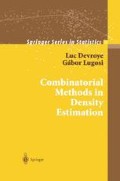Abstract
Assume that we are given a class of density estimates parametrized by θ ∈ Θ, such that f n, θ denotes the density estimate with parameter θ. Our goal is to construct a density estimate f n whose L 1 error is (almost) as small as that of the best estimate among the f n,θ , θ ∈ Θ. Applying the minimum distance estimate of Chapter 5 directly to this class is often problematic because of the dependence of each estimate in the class and the empirical measure μ n .
Access this chapter
Tax calculation will be finalised at checkout
Purchases are for personal use only
Preview
Unable to display preview. Download preview PDF.
§10.6. References
A. Barron, L. Birgé, and P. Massart, “Risk bounds for model selection via penalization,” Probability Theory and Related Fields, vol. 113, pp. 301–415, 1999.
G. Castellan, “Sélection d’histogrammes ou de modèles exponentiels de polynomes par morceaux à l’aide d’un critère de type Akaike,” Thèse, Mathématiques, Université de Paris-Sud, 2000.
L. Devroye and L. Györfi, Nonparametric Density Estimation: The L 1 View, Wiley, New York, 1985.
L. Devroye and G. Lugosi, “A universally acceptable smoothing factor for kernel density estimates,” Annals of Statistics, vol. 24, pp. 2499–2512, 1996.
U. Haagerup, “Les meilleures constantes de l’inégalité de Khintchine,” Comptes Rendus des Séances de l’Académie des Sciences de Paris. Séries A, vol. 286, pp. 259–262, 1978.
G. Lugosi and A. Nobel, “Consistency of data-driven histogram methods for density estimation and classification,” Annals of Statistics, vol. 24, pp. 687–706, 1996.
S. J. Szarek, “On the best constants in the Khintchine inequality,” Studia Mathematica, vol. 63, pp. 197–208, 1976.
Author information
Authors and Affiliations
Rights and permissions
Copyright information
© 2001 Springer Science+Business Media New York
About this chapter
Cite this chapter
Devroye, L., Lugosi, G. (2001). Additive Estimates and Data Splitting. In: Combinatorial Methods in Density Estimation. Springer Series in Statistics. Springer, New York, NY. https://doi.org/10.1007/978-1-4613-0125-7_10
Download citation
DOI: https://doi.org/10.1007/978-1-4613-0125-7_10
Publisher Name: Springer, New York, NY
Print ISBN: 978-1-4612-6527-6
Online ISBN: 978-1-4613-0125-7
eBook Packages: Springer Book Archive

